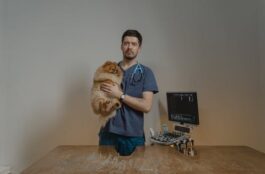
For pet parents, there’s nothing more valuable than seeing their furry companions lead a healthy, happy life. With age, pets require more attention and specialized care, much like humans. This is where the relevance of pet geriatric care assessments comes in – a comprehensive health checkup and evaluation for your aging pets to ensure they are in their best health possible.
Geriatric Care: Who Should Be In Charge?
Have you ever wondered who should conduct your pet’s geriatric care assessment? The unequivocal answer is experienced veterinarians. They’re skilled professionals trained to cater to your pets at all stages of their lives. Depending on your pet’s needs, the right vet might be a general practitioner or a vet specializing in geriatrics.
- Role of Veterinarians: Vets handle everything from routine checkups to specialized senior care.
- Specialized Veterinary Care: Some vets specialize in senior care, offering a comprehensive approach to managing the health of aging pets.
- Choosing the Right Vet: Picking the right vet for your pet’s senior care starts with understanding your pet’s specific needs and finding a vet who best meets them.
Understanding Geriatric Care Assessment
The geriatric care assessment is an all-encompassing evaluation of your pet’s health as they age. Be prepared for an initial discussion about their diet, behavior, exercise patterns, and any noticeable changes. Your pet will also undergo a physical examination.
What to Expect During an Assessment
Getting an assessment done is the first step in understanding your pet’s condition. Knowing what to expect during this process can help you prepare accordingly and, more importantly, ease your furry pal’s anxiety. Let’s explore step-by-step:
- Initial Consultation: The session usually begins with a detailed discussion about your pet’s health history, their symptoms, and your concerns. The veterinary internist will ask various questions; be prepared to provide comprehensive answers to help them better evaluate your pet’s condition.
- Physical Examination: After the initial discussion, the veterinary internist will thoroughly examine. This may involve checking your pet’s fur, skin, eyes, ears, teeth and gums, limbs, abdomen, chest, and rear areas for abnormalities.
- Diagnostic Testing: Based on the outcome of the preliminary examination, the internist might suggest some diagnostic tests. These may include a blood test, urine culture, imaging (such as X-ray or ultrasound), EKG, blood pressure measurement, or biopsies.
- Test Result Analysis: The test results will assist the veterinary specialist in making concrete diagnoses. They will interpret the results, considering all the information shared during the initial consultation and the physical examination findings.
- Treatment Plan: Once the diagnoses are concluded, the veterinary internist will discuss the best course of treatment. This could include medication, surgery, therapeutics, changes to their diet, or lifestyle adjustments. The discussion will consider your pet’s age, breed, severity of condition, and circumstances.
- Follow-up Schedule: After setting the treatment plan, the internist will outline a follow-up schedule to monitor your pet’s progress and make necessary treatment adjustments. The frequency of these follow-up visits will depend on your pet’s specific health condition.
Significance of Regular Geriatric Care Assessments
Like humans, pets’ health can change rapidly as they age. Early detection of potential health problems through regular geriatric care assessments is crucial for maintaining their quality of life. These checks prevent ailments from escalating and allow you to take proactive measures.
Frequency of Geriatric Care Assessments
While pets aged seven and above are generally recommended yearly assessments, the frequency depends on their health status and breed. Your vet will guide you on how often your pet should be seen.
Preparing for Geriatric Care Assessments
- Comfort: Make your pet comfortable. Reward good behavior during a vet visit.
- Consistency: Ensure regular schedules are maintained. Consistent vet visits can help catch diseases in their early stages.
Outcomes of a Geriatric Care Assessment
After the assessment, your vet will enlighten you about your pet’s health condition. If your pet is lucky to have a clean bill of health – great! However, your vet will guide you on the next steps if any health issues are detected.
Understanding the Diagnosis
It can be overwhelming to hear that your pet has been diagnosed with a condition. However, remember, early detection means early treatment. You can discuss treatment plans extensively with your vet.
For instance, a specialization such as Veterinary Internal Medicine would cover various treatments and disease management strategies from routine to complex cases. For more information about this, you can click here.
Cat and Dog Wellness Examinations
- Regular wellness exams for cats and dogs are the best way to prevent potential health problems.
- Wellness exams include thorough physical examinations, vaccinations, and parasite control.
- If you are looking for a cat checkup in Stockton with caring staff, plenty of options are available.
Geriatric Care for Pets and its Importance
- Geriatric care focuses on improving the quality of life for aging pets and managing age-related diseases.
- This usually involves comprehensive health checkups, routine blood tests, and dietary and lifestyle changes. Regular visits to a vet ensure optimal care for aging cats and dogs.
Conclusion
Taking care of your aging pet might seem challenging, but the advantages of regular geriatric care assessments are undeniable. By taking timely and appropriate measures, we can ensure our furry friends enjoy their golden years in well-deserved well-being and comfort.

